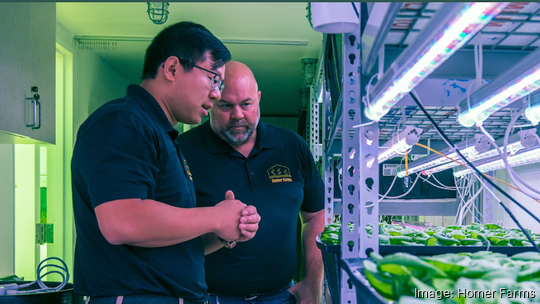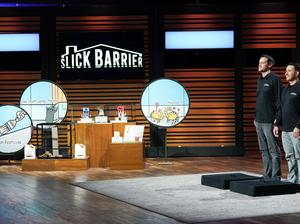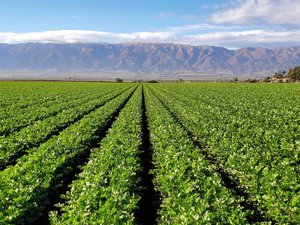
A Phoenix-based clean tech startup is planning a series of expansions that will create jobs and fuel the company’s growth in Arizona’s produce market.
Homer Farms Inc. is breaking ground in the coming weeks on a new solar-powered vertical farm on a 1-acre site at 2644 W. Belmont Ave. in north Phoenix.
The company signed a three-year lease with the city of Phoenix for the land with an option for a two-year extension. The vertical farm is partially funded via $600,000 in grants from the City of Phoenix Office of Environmental Programs, Salt River Project and Arizona State University.
“This new vertical farm will achieve energy independence using a micro-grid in collaboration with SRP and ASU, and Homer Farms has committed to donate at least 20% of its production from this farm to local communities via the City of Phoenix Office of Environmental Programs to mitigate food deserts in the city,” Zhihao Chen, cofounder and CEO of Homer Farms, told AZ Inno.
Homer Farms was prompted to expand operations because it's nearing capacity at its 10,000-square-foot existing vertical farm at 2750 W. Palm Lane in Phoenix, where it grows more than 1 million heads of lettuce per year for local grocery stores, hotels and universities, Chen said.
Homer Farms expects the north Phoenix vertical farm to be operational by the end of the year. Then, the company will turn its focus to yet another expansion: a 50,000-square-foot vertical farm that will create 100 jobs and is capable of producing 9 million to 14 million heads of lettuce per year.
The company plans to fund that $20 million project via a combination of grants, private investment and a U.S. Department of Agriculture loan, Chen said.
“We have several locations under discussion but nothing formalized yet. It will mainly depend on the final funds we have as it will decide whether we build our own warehouse or lease one,” Chen said. “We prefer to build or retrofit a warehouse with ownership, but it will depend on the funding situation. One thing for sure is that it will be in the Phoenix metro area, and very likely in the City of Phoenix as the city has been very supportive to us.”
The company aims to break ground on the warehouse by early 2025, Chen added.
Homer Farms partners with produce company for TruLocal brand
The company’s vertical farm consists of a modular growing system that uses a deep water hydroponic setup, which can cultivate various types of leafy greens and some fruits. Its system uses 98% less water than field agriculture, is pesticide and herbicide free, and can easily scale to meet demand, according to the company.
What's more, Homer Farms designs its own environmental control units, LED growing lights and vertical farming racks to ensure proper air circulation and light intensity for plant growth.
In addition to designing and constructing vertical farms, Homer Farms converts food waste from its customers — including Arizona State University’s dining halls — into fertilizer and bioenergy using a proprietary process. It then sells the fertilizer, Chen said.
The company’s clients include distributors that serve Walmart, Kroger, Bashas', Shamrock Foods, Aramark and Sodexo.
Homer Farms partnered with Rio Rico-based produce company SunFed to create a leafy greens brand, TruLocal, which distributes produce throughout Arizona.
“I'm partnering with these guys, primarily because of their vision and what they are sitting on in terms of an opportunity to change the ag space,” Craig Slate, CEO of SunFed, said.
Homer Farms’ ability to repurpose vacant buildings into vertical farms is another differentiator of the company, Slate added.
“The ability to utilize existing assets is a huge win for what they're trying to do,” he said. “When you go inside a warehouse, you don't have to use pesticides. You can eliminate herbicides. So when you think about what Chad (Geelhood) and Zhihao have done, it’s pretty amazing.”
'This model pencils out'
Chen, who is also an instructor at ASU’s College of Integrative Sciences and Arts, cofounded Homer Farms in 2018 with Chad Geelhood.
The initial idea for Homer Farms was sparked while Chen was doing some consulting work with a team for a project addressing water usage in Arizona, he said.
“We found out that 70% of the freshwater in Arizona is used for agricultural activities, and we thought, ‘Well, if we can find a way to reduce some of the water usage, then that can be really beneficial for the water resource management.”

That led to Chen’s creation of an organic closed system containing two shipping containers, consisting of a vertical farm that uses 95% less water than traditional agriculture and a system for breaking down more than 2,000 pounds of food waste per day and transforming it into fertilizer and methane gas, according to ASU News.
Homer Farms has 12 employees and is primarily bootstrapped aside from Arizona Innovation Challenge and city of Phoenix grants.
"The city of Phoenix is one of our largest grant sponsors as of today and we anticipate to receive more grants in the future from the USDA, EPA and the state of Arizona,” Chen said.
Homer Farms is bullish on moving forward with its vertical farming model to provide fresh produce to millions of people, said Geelhood.
“This model pencils out. We've got confidence in it. Think about how many metropolitan areas there are in the U.S. to start expanding to, when we prove the water savings, the quality of the food and the ability to go farm-to-table within two hours," Geelhood said.











